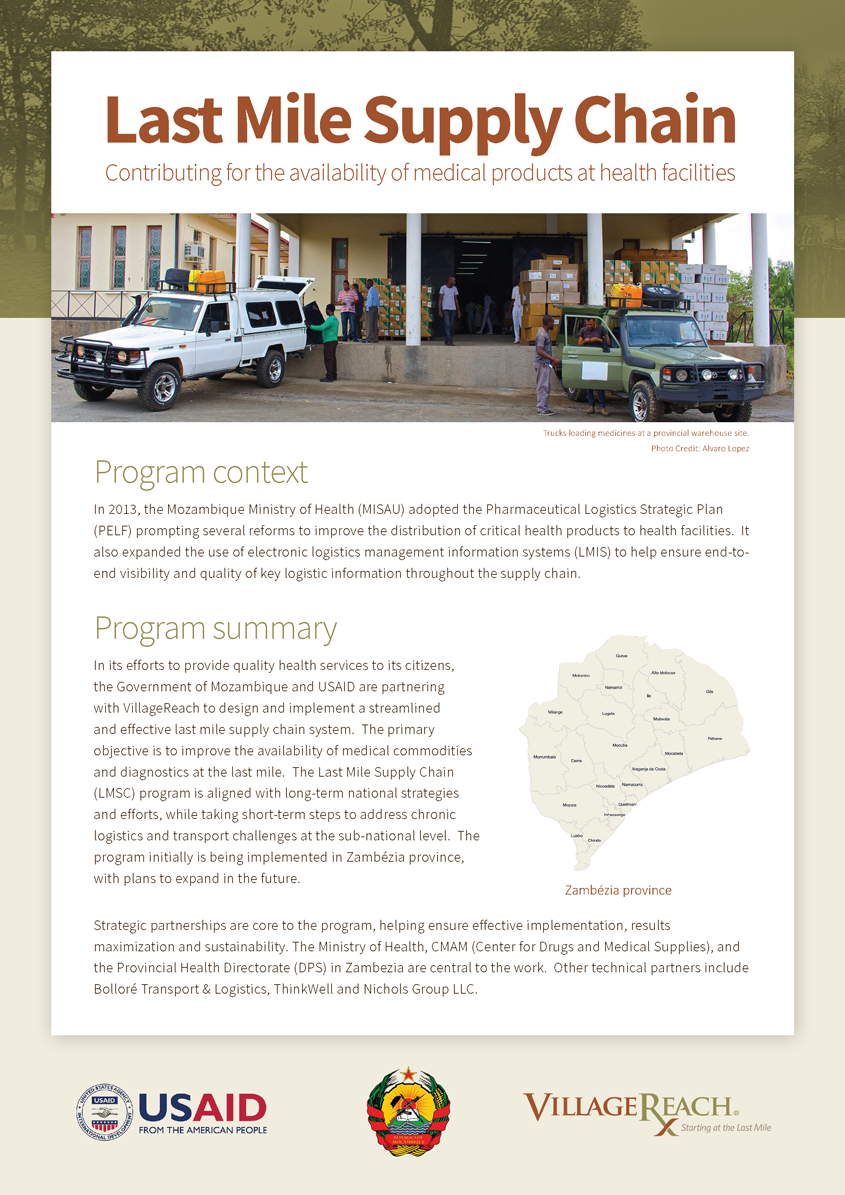Speeches Shim
Program context
In 2013, the Mozambique Ministry of Health (MISAU) adopted the Pharmaceutical Logistics Strategic Plan (PELF) prompting several reforms to improve the distribution of critical health products to health facilities. It also expanded the use of electronic logistics management information systems (LMIS) to help ensure end-toend visibility and quality of key logistic information throughout the supply chain.
Program summary
In its efforts to provide quality health services to its citizens, the Government of Mozambique and USAID are partnering with VillageReach to design and implement a streamlined and effective last mile supply chain system. The primary objective is to improve the availability of medical commodities and diagnostics at the last mile. The Last Mile Supply Chain (LMSC) program is aligned with long-term national strategies and efforts, while taking short-term steps to address chronic logistics and transport challenges at the sub-national level. The program initially is being implemented in Zambézia province, with plans to expand in the future. Strategic partnerships are core to the program, helping ensure effective implementation, results maximization and sustainability. The Ministry of Health, CMAM (Center for Drugs and Medical Supplies), and the Provincial Health Directorate (DPS) in Zambezia are central to the work. Other technical partners include Bolloré Transport & Logistics, ThinkWell and Nichols Group LLC.
Program approach
The technical approach to LMSC is based on five key principles to address current challenges. They include:
1. Strengthened stakeholder and technical management
LMSC will help establish a provincial logistics technical working group (TWG) composed of DPS and key supply chain and
specimen transport partners to support planning, accountability and recommendations of continuous system improvements. LMSC also will improve bi-directional logistics by bringing together specimen transport and supply chain under one management system, using technical expertise of a fourth party logistics provider (4PL).
2. Improved data collection and systems for endto-end visibility and accountability
The use of reliable and accessible data for decision-making and accountability is a cornerstone to LMSC. LMSC will embed a Visibility and Analytics Advisor to integrate distribution and stock management data. With the Central Laboratory Department (DCL), LMSC will add specimen referral data with laboratory information systems and create dashboards for regular review and analysis.
3. Capacity building to support logistics and management
LMSC will focus on improving long-term logistics capabilities at the sub-national level. Extensive training for the DPS staff will support management of the 4PL and data analytics, and ongoing training will be conducted for transport providers as well as health center, laboratory and warehouse staff.
4. Use of innovation to reliably reach all facilities
VillageReach is exploring innovative ways to ensure reliable distribution to even the most remote facilities. This could include moving products through unmanned aerial vehicles (UAVs) or by involving independent transporters in a ridesharing service.
5. Transfer to government
The LMSC program prioritizes documentation of processes, tools and methods, and the provision of associated training and technical support, to ensure CMAM and provincial government stakeholders can operate autonomously.
Expected results
- The primary goal of the LMSC program is to improve the availability of medical commodities and lab samples at health facilities, where they are needed for testing and treatment. Following are the expected outcomes.
- Supply chain information is used to strengthen accountability and planning in the supply chain between the provincial level and the health facility level.
- Transportation and logistics execution are improved.
- Appropriate control mechanisms are in place for distribution of medical commodities throughout the province.
- Proven transportation and related logistic processes and tools are transferred to government.


Comment
Make a general inquiry or suggest an improvement.